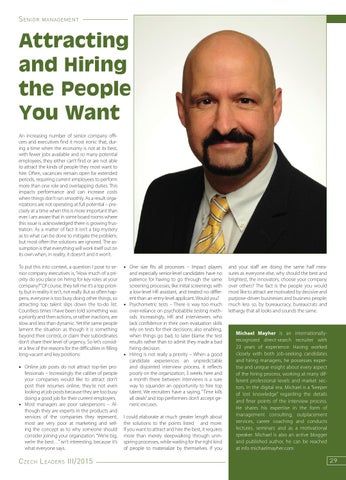S enior
management
Attracting and Hiring the People You Want An increasing number of senior company officers and executives find it most ironic that, during a time when the economy is not at its best, with fewer jobs available and so many potential employees, they either can’t find or are not able to attract the kinds of people they most want to hire. Often, vacancies remain open for extended periods, requiring current employees to perform more than one role and overlapping duties. This impacts performance and can increase costs when things don’t run smoothly. As a result organizations are not operating at full potential – precisely at a time when this is more important than ever. I am aware that in some board rooms where this issue is acknowledged there is growing frustration. As a matter of fact it isn’t a big mystery as to what can be done to mitigate the problem, but most often the solutions are ignored. The assumption is that everything will work itself out on its own when, in reality, it doesn’t and it won’t. To put this into context, a question I pose to senior company executives is, “How much of a priority do you place on hiring for key roles at your company?” Of course, they tell me it’s a top priority, but in reality it isn’t, not really. But as often happens, everyone is too busy doing other things, so attracting top talent slips down the to-do list. Countless times I have been told something was a priority and then actions, or rather inactions, are slow and less than dynamic. Yet the same people lament the situation as though it is something beyond their control, or claim their subordinates don’t share their level of urgency. So let’s consider a few of the reasons for the difficulties in filling long-vacant and key positions:
• Online job posts do not attract top-tier pro-
•
fessionals – Increasingly the caliber of people your companies would like to attract don’t post their resumes online; they’re not even looking at job posts because they are too busy doing a good job for their current employers. Most managers are poor salespersons – Although they are experts in the products and services of the companies they represent, most are very poor at marketing and selling the concept as to why someone should consider joining your organization. “We’re big, we’re the best…” isn’t interesting, because it’s what everyone says.
C zech L eaders III/2015
• One size fits all processes – Impact players
•
•
and especially senior-level candidates have no patience for having to go through the same screening processes, like initial screenings with a low-level HR assistant, and treated no different than an entry-level applicant. Would you? Psychometric tests – There is way too much over-reliance on psychobabble testing methods. Increasingly, HR and interviewers who lack confidence in their own evaluation skills rely on tests for their decisions; also enabling, when things go bad, to later blame the test results rather than to admit they made a bad hiring decision. Hiring is not really a priority – When a good candidate experiences an unpredictable and disjointed interview process, it reflects poorly on the organization; 3 weeks here and a month there between interviews is a sure way to squander an opportunity to hire top talent. We recruiters have a saying, “Time kills all deals” and top performers don’t accept generic excuses.
I could elaborate at much greater length about the solutions to the points listed and more. If you want to attract and hire the best, it requires more than merely sleepwalking through uninspiring processes, while waiting for the right kind of people to materialize by themselves. If you
and your staff are doing the same half measures as everyone else, why should the best and brightest, the innovators, choose your company over others? The fact is the people you would most like to attract are motivated by decisive and purpose-driven businesses and business people; much less so, by bureaucracy, bureaucrats and lethargy that all looks and sounds the same.
Michael Mayher is an internationallyrecognized direct-search recruiter with 23 years of experience. Having worked closely with both job-seeking candidates and hiring managers, he possesses expertise and unique insight about every aspect of the hiring process, working at many different professional levels and market sectors. In the digital era, Michael is a “keeper of lost knowledge” regarding the details and finer points of the interview process. He shares his expertise in the form of management consulting, outplacement services, career coaching and conducts lectures, seminars and as a motivational speaker. Michael is also an active blogger and published author, he can be reached at info michaelmayher.com
C zech L eaders III/2015
29
